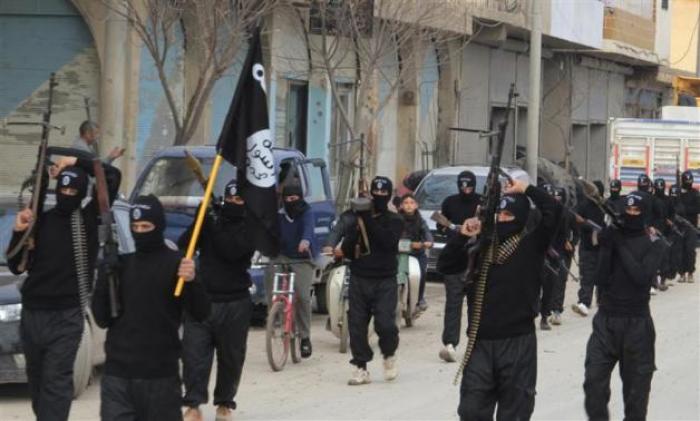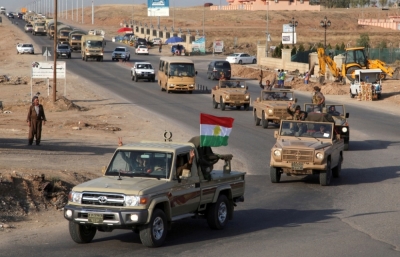Ex ISIS Member Reveals Turkey, a NATO Member, Is Supporting Islamic State

Testimony provided by a former member of the Islamic State in Syria indicates that ISIS militants view NATO member Turkey as their ally, and highlights the extent to which the militant group has coordinated its efforts with the Turkish government.
A former Islamic State communications technician working out the ISIS communications bureau in the Syrian stronghold of Raqqa said in an interview with Newsweek, last Friday, that the Turkish government allowed ISIS convoys to cross freely over its border and travel through the country to avoid combat in Kurdish controlled regions of Syria in efforts to attack more vulnerable Kurdish troops in Syria's northeastern region.
Speaking under the pseudonym of "Sherko Omer", the former ISIS communications technician who managed to escape, further added that the basis for the Turkish cooperation is that ISIS and Turkey share a common enemy: the Kurds.
"ISIS saw the Turkish army as its ally especially when it came to attacking the Kurds in Syria," Omer said. "The Kurds were the common enemy for both ISIS and Turkey. Also, ISIS had to be a Turkish ally because only through Turkey they were able to deploy ISIS fighters to northern parts of the Kurdish cities and towns in Syria."
Having worked in the ISIS communications bureau, Omer said that ISIS commanders had established a reliable line of communication with the Turkish army that allowed for ISIS convoys to travel through Turkey. When ISIS sent battalions to combat Kurdish forces in the most northeastern portions of Syria, they were allowed to cross through Turkey and that prevented ISIS forces from having to battle their way through the Kurdish-controlled portions of Syria.
"I have connected ISIS field captains and commanders from Syria with people in Turkey on innumerable occasions," Omer said. "I rarely heard them speak in Arabic, and that was only when they talked to their own recruiters, otherwise, they mostly spoke in Turkish because the people they talked to were Turkish officials of some sorts because ISIS guys used to be very serious when they talked to them."
Omer detailed an instance last February when he was transferred from the communications bureau to fight for a battalion that was tasked with travelling from Raqqa, through Turkey, to battle Kurds in the northeast Syrian town of Serekaniye.
Although the trip required passing through Turkey, Omer said that ISIS commanders reassured the battalion that they had lines of communication open with the Turkish army that would allow them to cross the border and travel through the country.
"ISIS commanders told us to fear nothing at all because there was full cooperation with the Turks," Omer said. "They reassured us that nothing will happen, especially when that is how they regularly travel from Raqqa and Aleppo to the Kurdish areas further northeast of Syria because it was impossible to travel through Syria as YPG [National Army of Syrian Kurdistan] controlled most parts of the Kurdish region."
When Omer's battalion got to Serekaniye, Omer said he surrendered when Kurds attacked his camp. Although he was held captive for months, the kurdish forces freed him because they felt he was not a fighter and determined that he committed no acts of violence. Omer claims he originally got involved in the conflict when he joined a Syrian rebel opposition group in their fight against Syrian President Bashar al-Assad. Once ISIS took over, he was stuck.

A spokesman for Kurdish People's Protection Unit (YPG) Pat Can told Newsweek that Turkish army is doing more to help ISIS than just letting them cross through their border freely. He said there is evidence that Turkey has also given supplies to ISIS, as well.
"There is more than enough evidence with us now proving that the Turkish army gives ISIS terrorists weapons, ammunitions and allows them to cross the Turkish official border crossings in order for ISIS terrorists to initiate inhumane attacks against the Kurdish people in Rojava [north-eastern Syria]," Can said.
Until the end of October, the Turkish government had prevented Kurdish fighters from crossing the border to help their Syrian Kurd allies. This prevented Kurds fighting ISIS, especially in the besieged town of Kobane, from getting the necessary reinforcements needed to win the battles.
Kurds from Kobane told Newsweek that Kurds that previously tried to cross the border while carrying weapons and other supplies were shot at by Turkish border patrol guards.
Kurdish Regional Government President Masoud Barzani said in a written statement that Turkey only allowed Kurdish fighters to use the border once the United States got involved in working out a border agreement between the Kurds and Turkey.
"Intense bilateral and trilateral talks were held among the U.S., Turkey and the Kurdish region to arrange access for the peshmerga," Barzani said. "After the talks, Turkey officially informed us that it would provide all kinds of support."




























